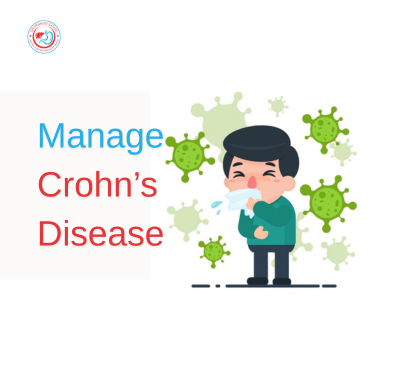Crohn’s disease is a chronic inflammatory bowel disease (IBD) that affects the digestive tract, leading to symptoms like abdominal pain, diarrhea, weight loss, and fatigue. Managing Crohn’s disease can be challenging, but with the right strategies, it is possible to live a fulfilling life despite the condition.
This blog explores the causes, symptoms, treatment options, and practical tips for managing Crohn’s disease effectively.
What is Crohn’s Disease?
Crohn’s disease is an autoimmune disorder that causes inflammation in the gastrointestinal (GI) tract. It most commonly affects the small intestine and colon, but inflammation can occur anywhere from the mouth to the anus.
The severity of Crohn’s disease varies from person to person. Some people experience mild symptoms, while others may have frequent flare-ups that impact daily life.
Symptoms of Crohn’s Disease
Symptoms can range from mild to severe and may include:
✔️ Chronic diarrhea
✔️ Abdominal pain and cramping
✔️ Weight loss and malnutrition
✔️ Fatigue and weakness
✔️ Fever and night sweats
✔️ Bloody stools or rectal bleeding
✔️ Mouth sores
✔️ Joint pain or skin rashes (extraintestinal symptoms)
Flare-ups can occur unpredictably, making symptom management crucial for improving quality of life.
Causes and Risk Factors of Crohn’s Disease
The exact cause of Crohn’s disease is unknown, but several factors are believed to contribute:
1. Immune System Dysfunction
Crohn’s is an autoimmune condition, meaning the immune system mistakenly attacks the digestive tract, leading to inflammation.
2. Genetic Factors
People with a family history of Crohn’s disease have a higher risk of developing the condition.
3. Environmental Factors
Certain environmental triggers, such as pollution, diet, and stress, may contribute to flare-ups.
4. Gut Microbiome Imbalance
An imbalance in gut bacteria may trigger inflammation in individuals prone to Crohn’s disease.
5. Smoking
Smokers are at a higher risk of developing Crohn’s disease, and symptoms may be more severe.
How to Manage Crohn’s Disease?
Although there is no cure for Crohn’s disease, a combination of medical treatment and lifestyle adjustments can help manage symptoms and prevent flare-ups.
1. Follow a Crohn’s-Friendly Diet
Diet plays a crucial role in managing Crohn’s symptoms. While there is no single diet that works for everyone, certain foods can help reduce inflammation and discomfort.
Foods to Eat:
✔️ Low-fiber foods (white rice, bananas, applesauce)
✔️ Lean proteins (chicken, fish, eggs)
✔️ Cooked vegetables (avoid raw veggies if they cause irritation)
✔️ Probiotic-rich foods (yogurt, kefir)
✔️ Healthy fats (olive oil, avocado)
Foods to Avoid:
❌ Dairy products (if lactose intolerant)
❌ Spicy and fried foods
❌ High-fiber foods (nuts, seeds, raw vegetables)
❌ Carbonated drinks and caffeine
❌ Processed and fast foods
💡 Tip: Keep a food diary to track which foods trigger flare-ups.
2. Medications for Crohn’s Disease
Medications are often necessary to reduce inflammation, manage symptoms, and prevent complications.
🔹 Anti-inflammatory drugs (Aminosalicylates) – Used for mild symptoms
🔹 Corticosteroids – Reduce inflammation during flare-ups
🔹 Immunosuppressants – Help control the immune response
🔹 Biologic therapies – Target specific proteins causing inflammation
🔹 Antibiotics – Used to treat infections related to Crohn’s
Your doctor will prescribe medication based on symptom severity and response to treatment.
3. Stress Management
Stress is a known trigger for Crohn’s flare-ups. Practicing stress-reduction techniques can help keep symptoms under control.
✔️ Mindfulness and meditation
✔️ Regular exercise (yoga, walking, swimming)
✔️ Deep breathing exercises
✔️ Engaging in hobbies
✔️ Seeking support from friends, family, or a therapist
4. Stay Hydrated
Chronic diarrhea can lead to dehydration, so it’s essential to drink plenty of fluids throughout the day.
✔️ Drink water, herbal teas, and electrolyte solutions
✔️ Avoid alcohol and caffeine, which can irritate the gut
5. Get Regular Check-Ups
Regular check-ups with a gastroenterologist can help monitor disease progression and adjust treatment as needed.
✔️ Colonoscopy and imaging tests can detect complications early.
✔️ Blood tests help monitor inflammation and nutrient deficiencies.
Surgical Options for Crohn’s Disease
In severe cases, surgery may be required when medications fail to manage symptoms. Surgical options include:
🔹 Bowel resection: Removing the diseased part of the intestine
🔹 Strictureplasty: Widening of narrowed sections of the intestine
🔹 Fistula removal: Closing abnormal connections between organs
Surgery is usually a last resort, and most patients can manage Crohn’s disease with medication and lifestyle changes.
Living with Crohn’s Disease: Daily Tips
✔️ Follow a balanced diet tailored to your symptoms.
✔️ Manage stress through relaxation techniques.
✔️ Take prescribed medications consistently.
✔️ Stay physically active with gentle exercises.
✔️ Join a support group to connect with others living with Crohn’s.
✔️ Maintain regular doctor visits to monitor your condition.
Living with Crohn’s disease can be challenging, but with the right diet, medications, stress management techniques, and medical care, it is possible to lead a healthy life.
If you have Crohn’s disease, work closely with your doctor to create a personalized treatment plan that helps you manage symptoms and maintain overall well-being.
FAQ
1. Can Crohn’s disease be cured?
No, Crohn’s disease is a chronic condition with no known cure. However, it can be managed effectively with medications, dietary changes, and lifestyle modifications.
2. What is the difference between Crohn’s disease and ulcerative colitis?
Both are types of inflammatory bowel disease (IBD), but Crohn’s can affect any part of the digestive tract, while ulcerative colitis only affects the colon and rectum.
3. Can Crohn’s disease lead to complications?
Yes, if left untreated, Crohn’s can cause intestinal blockages, fistulas, malnutrition, and colon cancer. Regular medical check-ups help prevent complications.


